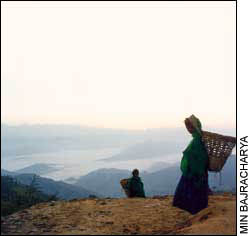 The remote mountain districts of western Nepal are food-deficit even in normal times. But nine months of emergency and escalating violence have crippled food convoys, leading to severe undernourishment of hundreds of thousands of people.
The remote mountain districts of western Nepal are food-deficit even in normal times. But nine months of emergency and escalating violence have crippled food convoys, leading to severe undernourishment of hundreds of thousands of people. In addition, the monsoon failed in western Nepal this year, and villagers who would otherwise have corn, potato, or millet this time of year have almost nothing to eat. Women and small children have already started showing signs of malnutrition.

"We used to grow enough food to last six months, but with the drought and the food embargo, we may have nothing this year," says Ram Bahadur KC of Ramdi in Pyuthan. Locals traditionally migrate to India for work to feed their families, but fear of harassment by Indian police of Nepalis suspected of being Maoists is keeping them home. "But there is no food for us here," says Rekh Bahadur Pun of Pang in Rolpa.
The security forces have been trying to starve out the rebels by restricting food going up the valleys, but that has had the opposite effect. Ordinary villagers are hungry, while the Maoists smuggle in supplies on secret jungle trails. A student at Sirjana Jyoti School in Gumchal told us: "The village has no food, but the Maoists eat rice, noodles, powder milk, biscuits." Worse, the student adds, militia regularly raid villages for the little food farmers have kept aside for the winter.
Some local officials say hunger isn't that bad, and accuse the Maoists of propaganda. "They've felt the effect of the embargo, that is why they've asked the locals to talk of a shortage," Rolpa CDO Birendra Nath Sharma told us. But local representatives of the Nepali Congress and the UML say their constituents are on the verge of starvation due to the embargo and the drought together.
This year's drought is expected to reduce Nepal's total rice production by 100,000 tons, much of it in the mid- and far-west. Last year Nepal produced 4.2 million tons of paddy. The country may have enough food, but how will it get to those who need it? With no jobs, locals don't have cash to buy food. "Business is down 70 percent," says Dor Bahadur Khadka, a hotelier and school teacher at Sulichaur. "We're not allowed to bring in batteries, noodles and rice." The food shortage gets worse further west and north. Having food at district headquarters would make little difference: the Maoists wouldn't allow people to go to get it. Not just food is in short supply, a half-full matchbox is sold for Rs 5.
The district headquarters of Kalikot, Jumla, Humla and Mugu are under government control, but Maoists hold sway in the hinterland. In towns the food embargo affects civil servants and officials, and in villages people have no food due to Maoist extortion.
The Nepal Food Corporation has shut down its godowns outside the district headquarters fearing Maoist raids. "We understand the hardship, but we can do little," says Rup Singh Bhandari, chief of the NFC's Nepalganj office. The godowns are full, but there are no helicopters to take grain to remote districts. Mule transport to Mugu and Kalikot has stopped after Maoists destroyed the suspension bridge on the Tila at Raraghat.
There's been an exodus of villagers from the five districts of the Karnali Zone. "Everyone between the ages of 10 and 50 has left," says Deep Bahadur Shahi, former Kalikot DDC chairman. "Women till the fields, but can't produce enough. Besides we have 'guests' to feed," Shahi says, referring to Maoists.
Security concerns for staff and the difficulty of working in insurgency areas is forcing donors in food for work programmes to re-evaluate their projects. The UN's World Food Programme and the German aid agency GTZ suspended programs in Jajarkot and Mugu in April after Maoists looted their food stores. The two are now trying to find ways to work directly with user groups to take food to the districts. "The situation isn't as bad as it is made out to be now, as there is something in the fields," Dietrich Stotz of GTZ's Integrated Food Security Project told us. "I expect bigger problems after December, when the people have eaten whatever they could grow."


